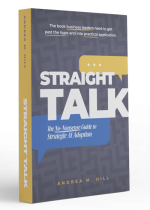Improve Your Hiring Interviews With Situational Judgment Theory

Andrea Hill's
Latest Book
Straight Talk
The No-Nonsense Guide to Strategic AI Adoption

Where other books focus on prompts and tools, this book gives business leaders what they actually need: the frameworks and confidence to lead AI adoption responsibly, without having to become technologists themselves.
Also available at independent booksellers and public libraries.
|
Getting good results starts with asking good questions. If I’m in the market for a used car, I would think about what I want in a car. But if I don’t know much about cars, I might end up asking questions like, “Can it play Spotify from my phone?” or “How’s the AC?” Of course I’d check the mileage, but if that’s all I do, I can’t be sure I’m getting a good car. I should ask how well the car has been maintained, if the car has been in any accidents, what repairs have been made in the past, and so on. In order to find the right answer, you have to ask the right questions. Figuring out what the right questions are can be the hardest part of any decision-making process, and it is of particular importance in the recruiting process. Lots of candidates have a great resume, and they may have been great in their previous role, but you have to be sure that they will be great in the role you are hiring for. If we don’t know what we’re looking for in a candidate, and we don’t know how to find it, we won’t end up with the right people. We’ve talked about competency-based interviewing as a method for asking the right questions, probing deeply, and prompting specific examples from candidates. Situational judgment theory will improve your hiring interviews in a similar way. It can add tremendous insight to the interview process, and it’s accessible to any hiring manager by learning a few key steps. What is Situational Judgment Theory?Situational judgment theory in the hiring process involves presenting candidates with hypothetical scenarios to evaluate their responses and test their judgment and decision-making skills. As in the competency-based interviewing framework, these questions go beyond “how might you…” or “give me an example of…” questions. Using evidence-backed processes such as competency-based interviewing and situational judgment theory help employers, first of all, get a better understanding of the roles they are hiring for. You can’t develop a situational judgment test without knowing the ins and outs of a position, from the duties involved to the skills required. Armed with that knowledge, employers are then able to develop a standardized bank of questions to ask all candidates. Not only are all candidates asked the same questions, the questions must be asked in the same way so that contextual factors like tone of voice and specific phrasing can be eliminated as variables. The result is that all are evaluated fairly, according to the same criteria. When situational judgment theory is used well, the benefits to employers and employees alike are clear:
How to Conduct an Interview Using Situational Judgment Theory So obviously, you need a degree in psychology to use situational judgment theory, right? Not at all! It just takes a little bit of thought and planning to improve your hiring interviews. Step 1: Know Your RoleBring your team together to analyze the role you are hiring for. What duties will the new hire perform? What skills will they need? What are the key competencies? If this is not a new role, analyze what previous employees in this role did well and what skills allowed them to succeed, and get a clear sense of what went wrong when previous employees failed. Step 2: Brainstorm SituationsThe “situational” in “situational judgment theory” is all about realistic situations. These aren’t just hypotheticals; these are actual situations that past employees have encountered or that future employees will certainly encounter in the course of their work. The situations you ask about should not be outlandish, once-in-a-lifetime problems but everyday decisions that are typical of the role. Step 3: Develop Questions and AnswersWith a list of situations in hand, begin developing the questions you’d like to ask your candidates. Each question should address a single skill or competency. Be sure to provide all relevant contextual information, but do not burden them with extraneous information, red herrings, or “gotcha” or tricky phrasing. The questions must be as objective as possible, with nothing in the text that could lead them to answer in one way or another. Situational judgment assessment questions follow a subject/situation/problem/question format. Subject: Make it clear at the beginning of every question that the candidate is working in this particular role for this particular company. Situation: The specific job function the subject is carrying out for the purposes of the question. This is where knowing the core competencies of the role comes in handy. Problem: The main dilemma of the question. It’s where the candidate has to exercise their judgment. Question: The question directs the candidate’s focus and indicates which particular skill they will be using to solve the problem. This website provides a few example questions where you can see the subject/situation/problem/question format in action. Let’s take a look at the first question: You are a department manager and you have recently thought of a new procedure that you believe would improve the work process. Some of the employees in your department agree with the change and some do not. One of your employees openly criticizes the idea to your director. What would you do and why? Subject: You are a department manager… Situation: …and you have recently thought of a new procedure that you believe would improve the work process. Problem: Some of the employees in your department agree with the change and some do not. One of your employees openly criticizes the idea to your director. Question: What would you do and why? These sample questions provide a good start for getting the hang of crafting the right kinds of questions. Your own questions should offer even more detail. Rather than just “department manager,” mention which department, for instance. Step 4: Solicit FeedbackOnce you’ve drafted the questions, solicit feedback from your team, whether that’s the HR department, the department you are hiring for, or anyone else whose opinion would be helpful. Ask them to provide their own answers. If you’re not getting the types of responses you expect, you might want to go back to an earlier step, whether that is defining the job, its duties, and its requisite skills, coming up with better situations, or refining the wording of your questions. Step 5: Conduct the InterviewOnce you’re sure your questions accurately reflect the duties and responsibilities of the role and are phrased in such a way that the candidate won’t be confused or led astray, you are ready to conduct the interview. Ask Better Questions, Hire Better EmployeesPlenty of applicants submit great resumes and get glowing recommendations from references. There are lots of people out there that might make a good impression in an interview. But relevant experience and good vibes will only get you so far. You need good data if you’re going to make important hiring decisions. Situational judgment theory sounds complicated, but following a few simple steps will get you that much closer to putting together your dream team. |
Are You Ready to Do Better Growth Management?
MentorWerx is all about growth strategy and management. That means giving you the tools you need to develop sound strategies, structure your organization to lay the track ahead of the train, and implement the tools you need to grow. Ready to learn more about how we do that? Book a free consult and bring your questions. See if you like working with us on our dime, and get some good advice in the process.